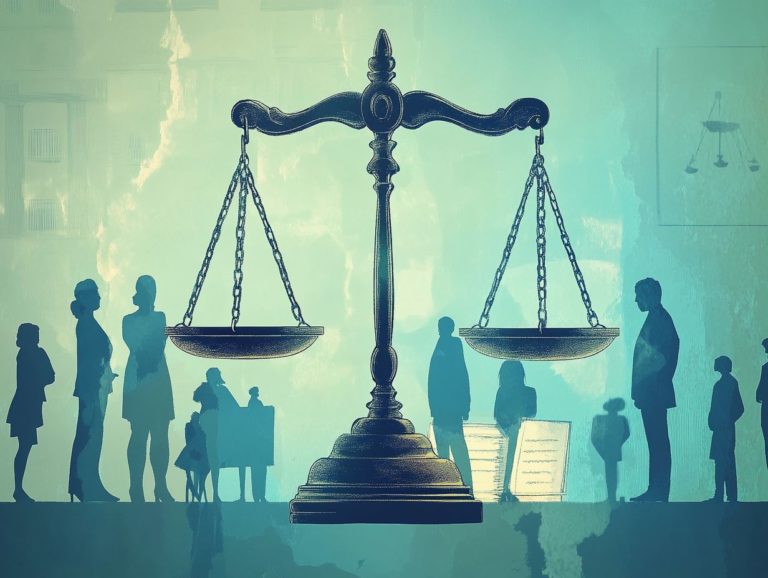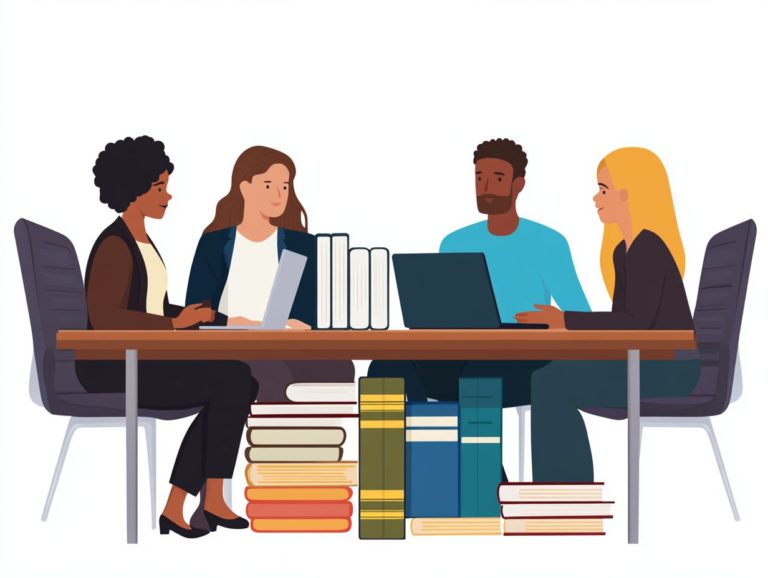5 Tips for Finding Legal Help for Your Rights
Navigating the legal landscape can feel overwhelming, particularly when it comes to safeguarding your rights. Whether you re addressing a personal issue, a business matter, or a more complex legal situation, knowing how to seek the appropriate legal assistance is vital.
This article presents five essential tips to steer you through the process, from grasping your rights to interviewing potential lawyers. Equipped with the right information and resources, you can confidently proceed to protect your interests.
Contents
- Key Takeaways:
- 1. Know Your Rights
- 2. Research Different Types of Legal Help
- 3. Consider Your Budget
- 4. Ask for Recommendations
- 5. Meet with Potential Lawyers
- What Are Your Legal Rights and How Can You Protect Them?
- What Are the Different Types of Legal Help Available?
- How Can You Determine What Type of Legal Help You Need?
- What Are the Costs Associated with Legal Help?
- How Can You Find Trustworthy and Reliable Legal Help?
- What Questions Should You Ask During a Meeting with a Potential Lawyer?
- How Can You Ensure Your Rights Are Being Protected During Legal Proceedings?
- What Are the Common Mistakes to Avoid When Seeking Legal Help?
- Frequently Asked Questions
- What are the top 5 tips for finding legal help for your rights?
- Is it important to assess my legal needs before seeking help?
- How can I find a reliable and experienced lawyer?
- Are there any potential red flags to watch out for when seeking legal help?
- Can I negotiate the fees and expenses associated with legal help?
- What should I do if I cannot afford legal help?
- What are the top 5 tips for finding legal help for your rights?
- Is it important to assess my legal needs before seeking help?
- How can I find a reliable and experienced lawyer?
- Are there any potential red flags to watch out for when seeking legal help?
- Can I negotiate the fees and expenses associated with legal help?
Key Takeaways:

- Know your rights and the types of legal help available to protect them.
- Research and consider your budget when looking for legal help.
- Ask for recommendations and meet with potential lawyers to find trustworthy and reliable help.
1. Know Your Rights
Understanding your legal rights is essential. This is particularly important in the complex area of immigration law, including Deferred Action for Childhood Arrivals (DACA) and deportation defense. Knowledge truly is power, and being aware of your rights enables you to make informed decisions on your legal journey.
Organizations like UWD and various community groups are ready to provide the legal assistance and guidance you need. They ensure that you are fully aware of your protections under the law.
These protections include deferred action status under DACA, which allows eligible young immigrants to stay in the country without the constant anxiety of deportation. Trusted community organizations play a pivotal role in educating you about your rights, offering resources that clarify legal processes and options.
Legal representation is vital. Skilled attorneys can help you navigate complex legal issues and build a robust defense against deportation, advocating for your fair treatment and justice within the immigration system. Reach out for support from these invaluable resources to strive for the best possible outcomes in your immigration matters.
2. Research Different Types of Legal Help
When seeking legal assistance, it s essential to explore the various types of legal services available, including those offered by accredited representatives, legal aid organizations, and pro bono attorneys associated with the American Immigration Lawyer Association. Each option has unique characteristics tailored to meet diverse needs and situations.
Private attorneys often charge hourly fees or flat rates, which can quickly add up, making them less accessible for individuals with low incomes. In contrast, accredited representatives usually provide assistance at more affordable rates, specializing in immigration matters.
Legal aid clinics offer invaluable support to those who qualify based on specific income criteria, often at no cost, focusing primarily on public benefits and other essential services. By understanding these distinctions, you can navigate your options more effectively and identify the legal assistance that best aligns with your circumstances.
3. Consider Your Budget
Budget considerations play a crucial role when seeking legal assistance, as attorney fees can vary widely depending on the type of legal services you need. If you re on a tight budget, you might qualify for pro bono assistance.
Some attorneys charge hourly rates ranging from $150 to $500, influenced by their experience and the complexity of your case. Others may offer flat fees for specific services like drafting wills or managing straightforward divorces. Understanding these costs is essential for making informed decisions.
If financial hardships weigh on you, various resources are available, including legal aid organizations that provide pro bono services. To determine your eligibility, check the federal poverty guidelines, which lay out the income thresholds that help assess whether you qualify for such assistance.
By exploring these options, you can tackle your legal challenges without the burden of overwhelming debt. You have the power to protect your rights take action now!
4. Ask for Recommendations
Finding a trusted lawyer often starts with recommendations from community organizations, friends, or family who have navigated similar legal waters. Their insights can be invaluable.
These referrals form a solid foundation for evaluating potential legal representation. Personal stories showcase a lawyer’s specialized skills and how they interact with clients. Take the time now to assess these referrals, as they are key to your legal success.
Consider factors such as the lawyer’s track record, areas of specialization, and client satisfaction levels. When searching for a lawyer, look for key qualities like effective communication skills, integrity, and a proven history of successful outcomes.
These attributes can significantly influence the legal advice you receive and shape your overall experience during what can often be a challenging time.
5. Meet with Potential Lawyers

Meeting with potential lawyers is a crucial step in securing the right legal representation for yourself. This is your chance to evaluate their expertise in your legal issues, such as deportation defense.
To maximize your meeting’s productivity, prepare relevant documents, including your identification, court notices, and evidence related to your case.
Compiling a list of questions can also provide valuable clarity regarding their experience and approach. Don’t hesitate to inquire about their attorney licensing to confirm their qualifications, and ask how many cases similar to yours they’ve successfully handled.
Understanding the specific strategies they propose will bolster your confidence in their capabilities and offer insight into how they plan to advocate for your interests.
What Are Your Legal Rights and How Can You Protect Them?
Your legal rights are the cornerstone of your protection in immigration matters, including those associated with DACA. Understanding these rights is crucial for navigating immigration laws and ensuring you receive proper representation from trusted legal professionals or community organizations.
As an immigrant, you possess specific legal rights that safeguard your well-being. These include:
- the right to a fair hearing
- protection against discrimination
- certain privileges under programs like DACA, which stands for Deferred Action for Childhood Arrivals
DACA is instrumental in providing temporary relief from deportation for eligible individuals, allowing you to work and study without the looming threat of removal.
To safeguard these rights, seeking legal representation is paramount. Experienced attorneys can advocate effectively on your behalf when facing immigration issues. Community support networks also provide valuable resources, assisting you in understanding your options and navigating potential pathways for deportation defense.
Knowing which organizations and legal experts to approach is essential for building a robust support system that ensures your rights are upheld amid the challenges posed by immigration law.
What Are the Different Types of Legal Help Available?
You ll find a variety of legal assistance options for those seeking support with immigration-related issues, including services from accredited representatives, legal aid organizations, and pro bono offerings for individuals in need.
Each of these avenues plays a distinct role in tackling the diverse challenges faced by immigrants. Nonprofit legal aid organizations often provide free or low-cost legal assistance to qualifying individuals, focusing on navigating the complexities of immigration processes, such as asylum applications or family reunification.
Private attorneys tend to offer a more personalized service, with fees reflecting their specialized expertise in areas like visa applications or deportation defense. Accredited representatives, often linked to recognized organizations, serve as a bridge between legal aid and private services.
They deliver professional guidance at lower rates than private attorneys, ensuring that access to justice is within reach.
How Can You Determine What Type of Legal Help You Need?
Determining the type of legal assistance you need begins with a clear understanding of your specific legal issues.
It’s important to identify the type of representation that suits your needs, whether it involves general legal advice or specialized help with immigration matters.
This evaluation often depends on the unique circumstances of your situation. The complexity of each case can significantly influence the legal experience required.
For example, if you’re navigating a family dispute, you will need a different approach compared to someone negotiating a contract or facing criminal charges.
It’s essential to categorize these issues accurately; underestimating the complexity could lead to costly delays or mistakes.
Community organizations can play a crucial role in guiding you through this process. They typically offer resources and support that help clarify your legal needs, empowering you to make informed decisions about the type of legal advice that best fits your situation.
What Are the Costs Associated with Legal Help?
The costs associated with legal assistance can vary significantly. It’s crucial to understand potential attorney fees based on the type of legal services you need, especially if you qualify for funding or public benefits.
The overall pricing structure is often influenced by key factors: the attorney’s experience level, your case’s complexity, and the practice’s location.
Attorneys in urban areas generally charge higher fees due to the cost of living and greater demand for their expertise. In contrast, those in rural regions may offer more budget-friendly options.
If you have limited financial resources, consider exploring options such as:
- Pro bono services (legal services provided for free)
- Sliding scale fees
- Legal aid organizations
These can provide essential support when you need it most.
Transparency in legal pricing is vital. It ensures you understand any fees involved before engaging their services, fostering trust and clarity in the attorney-client relationship.
How Can You Find Trustworthy and Reliable Legal Help?

Finding trustworthy legal help might seem overwhelming, but it doesn’t have to be! Exploring resources such as community organizations, referrals from friends, and directories of accredited representatives can make your journey much smoother.
Start by verifying the licenses of potential legal professionals, ensuring they are in good standing with their state bar associations.
It’s wise to seek out online reviews and testimonials; these can reveal a lot of information about an attorney’s reputation and past performance.
Engaging with community organizations can provide invaluable insights and recommendations. They often direct you to trusted resources with a solid track record of helping others.
This approach instills confidence in your choice of legal counsel and supports the broader community by uplifting reputable practitioners.
What Questions Should You Ask During a Meeting with a Potential Lawyer?
When you meet with a potential lawyer, it’s essential to ask targeted questions that reveal their experience with your specific legal issues.
Engage in a conversation about how they have navigated similar cases and what strategies they might use to address your situation.
It’s not just about their technical expertise; evaluating their communication style is also important. Do they explain legal concepts in a way that makes sense to you? Are they responsive to your concerns?
Understanding their approach to resolving legal disputes and their methods for keeping clients informed can significantly influence your comfort and trust in their representation.
How Can You Ensure Your Rights Are Being Protected During Legal Proceedings?
To protect your rights during legal proceedings, take a proactive approach. Secure trusted representation and understand your legal rights.
Keep communication open with your legal representatives. Regularly ask questions about your case and provide necessary documents promptly.
Being informed about your rights in immigration matters lets you make educated decisions. Accredited representatives have specialized training and can guide you through legal challenges.
What Are the Common Mistakes to Avoid When Seeking Legal Help?
When looking for legal assistance, don t skip researching potential lawyers. Neglecting to check their experience can lead to inadequate representation.
Be sure to review a lawyer s track record carefully. Ignoring this can result in unfavorable outcomes when expertise is critical.
Many people think all lawyers are equally skilled. This can lead to overlooking important details like specialization and client reviews.
Take the time to conduct thorough research. It s crucial to find representation that matches the complexities of your legal matter.
Frequently Asked Questions
What are the top 5 tips for finding legal help for your rights?
1. Research different resources. Look into legal aid organizations, pro bono services, and referral programs.
Is it important to assess my legal needs before seeking help?
Yes, knowing your legal needs first is essential. It helps you find the right assistance for your situation.
How can I find a reliable and experienced lawyer?
Ask trusted friends or family for recommendations. Online reviews and initial meetings are also helpful in making your choice.
Are there any potential red flags to watch out for when seeking legal help?
Yes, be wary of lawyers who promise specific results or pressure you to sign contracts without full understanding. These can indicate unethical practices.
Can I negotiate the fees and expenses associated with legal help?
Absolutely! Discuss fees and expenses with your lawyer before signing. Understanding the payment structure and potential extra costs is key.
What should I do if I cannot afford legal help?
If you can’t afford a lawyer, seek help from legal aid organizations or pro bono services. You can also apply for a lawyer provided by the court.
What are the top 5 tips for finding legal help for your rights?
1. Research available resources. Look for legal aid organizations, pro bono services, and referral programs.
Is it important to assess my legal needs before seeking help?
Yes! Understanding your legal needs helps you find the right assistance for your situation.
How can I find a reliable and experienced lawyer?
Ask trusted friends for recommendations and check online reviews. Meet potential lawyers to discuss your case before deciding.
Are there any potential red flags to watch out for when seeking legal help?
Be cautious of lawyers who guarantee specific outcomes or pressure you to sign quickly. These can indicate unethical practices.
Can I negotiate the fees and expenses associated with legal help?
Absolutely! Don’t hesitate to discuss and negotiate fees with your lawyer before signing a contract. Understand the payment structure and potential costs.







